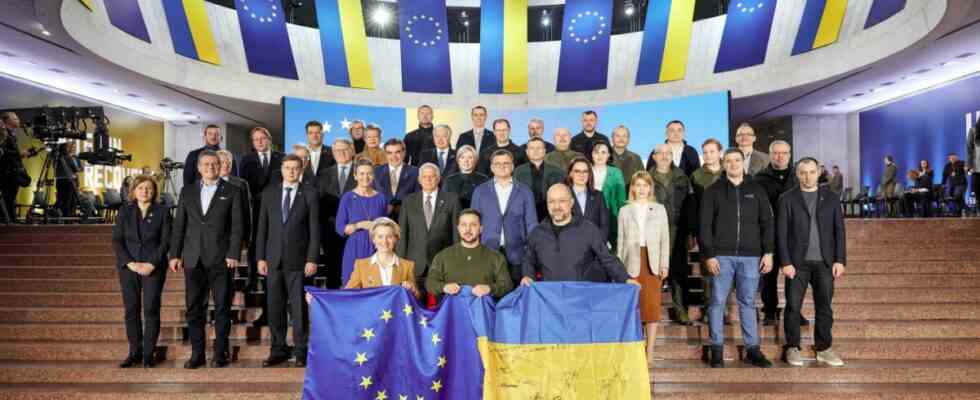What do you call it when there is a gap between words and deeds? Hypocrisy? Diplomacy? Pragmatism? In any case, this is how the European Union’s dealings with Ukraine can be described: the rhetoric is more ambitious than reality. The summit meeting between EU leaders and the Ukrainian government on Friday in Kyiv revealed this gap.
The place and time of the summit were highly symbolic: the meeting between EU Commission President Ursula von der Leyen, EU Council President Charles Michel and the Ukrainian head of state Volodomir Zelensky was the first of its kind since the Russian attack began almost a year ago. It was also the first to take place in a war zone – on the morning of the summit, an air alert was sounded in Kyiv. The main message that should come out of the meeting, to the Ukrainians as well as to the regime in Moscow, was: Europe stands firmly on the side of the attacked. The summit shows that Russia’s war is a “strategic failure,” said von der Leyen.
There was also no lack of oaths of solidarity. “The EU will support Ukraine and the Ukrainian people against the ongoing Russian war of aggression for as long as is necessary,” the summit statement said. “The EU and Ukraine are one family,” said Michel. The Union has made a “clear decision” that Ukraine belongs to it and will not be intimidated by Moscow. “Your destiny is our destiny,” said Michel. Von der Leyen called the country a “true inspiration” for Europe.
In addition to words, the EU supports Ukraine with money. The Union and its member states have already provided around 50 billion euros in humanitarian, economic and military aid, von der Leyen calculated in Kyiv. The EU has approved 18 billion euros for this year alone to save the Ukrainian state from collapsing. Diplomats expect that this sum will have to be increased.
Opinions within the Union differ on the question of what place Ukraine should have in the EU in the longer term
Brussels has already added to the training mission for the Ukrainian army – instead of the planned 15,000 soldiers, 30,000 are to be trained in EU countries. In addition, the EU wants to further tighten its punitive measures against Russia. There are already nine packages of sanctions, and the tenth should be ready by the anniversary of the Russian attack on Ukraine on February 24 at the latest. Von der Leyen even visited a post office in Kyiv where Ukrainians can pick up energy-saving LED light bulbs. The EU wants to give the country 50 million pieces to relieve the bombed-out power grid.
However, opinions within the Union differ on the question of what place Ukraine should have in the EU in the longer term. Last June, the 27 member states granted Ukraine candidate status. But no formal accession negotiations have started yet. And the list of demands from Brussels is long. They range from rule of law reforms to steps in the fight against corruption.
Selensky wants to open accession negotiations this year. According to the government in Kyiv, Ukraine should become a full member of the Union by 2024. Ukraine has already fulfilled 72 percent of all conditions contained in the association agreement, said Zelensky.
But Kiev’s demands clearly go too far for many EU members – with the willingness to quickly absorb Ukraine diminishing as the EU moves West. The strongest supporters of Kiev are the Baltic States and Poland. France, Spain and Portugal are more skeptical about joining soon. Germany does not support Kiev’s ambitious schedule either.
The final declaration of the summit therefore does not contain any detailed statements on the course of the further accession process, let alone a date for full membership. After the meeting, von der Leyen and Michel talked about quick help to repair Ukraine’s destroyed infrastructure – but not about quick accession. “There are no rigid deadlines, but goals that you have to achieve,” said von der Leyen. But she was “deeply impressed” by the way Ukraine is pushing ahead with reforms.
This is disappointing for Zelensky. But the Ukrainian president has also learned in 12 months of war that maximum public pressure can make the EU move. Sometimes even against their will and amazingly fast.

